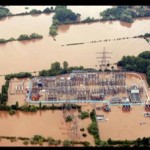It’s not every day that you can learn about resilience and crisis management from a senior civil servant who is involved with planning the government’s response to threats ranging from terrorist attacks to floods. But civil servants at a recent discovery session in Blackpool had precisely that opportunity.
Paul McClochrie from the Civil Contingencies Secretariat took time out from a busy schedule to give colleagues the benefit of his experience in crisis management planning, and to talk about the lessons we could all learn and put into practice in our daily lives.
Paul explained the UK’s crisis management procedures, and shed light on the workings of Cabinet Office Briefing Room, often referred to by the media as COBRA. It replicates in miniature the key government machinery in a single room, to enable rapid collective decision-making, authorise the deployment of national assets and provide strategic advice.
The UK’s resilience is the ability to anticipate, prepare for, respond to and recover from a crisis. In other words, to roll with the punches. Personal resilience is about doing all that, but then transforming a challenge into an opportunity, absorbing learning and minimising physical and mental costs.
Why is personal resilience important? If you experience adversity or stress, you might have feelings of anger, grief, pain, fear and confusion; resilient people can carry on functioning despite such emotional trauma. Resilience helps us to survive, but it also aids personal growth and development. Resilient people are able to harness their inner strength to help them rebound from adversity, which is a core component of stress management.
Paul explained that pressure is part of life and can be a good thing: it can help to motivate and focus, aid concentration and decisiveness. Some people actively enjoy being under pressure and thrive on the adrenalin it produces. However, if pressure becomes excessive and tips over into stress, it can lead to your brain becoming overloaded with negative thoughts, impairing decision-making and giving rise to self-doubt and a lack of confidence.
We should be aware of the signs of stress so that we can do something about it at an early stage. Signs include tiredness and irritability, poor concentration, mood swings, and feeling insecure. But, of course, preparedness starts before signs of stress have been identified. We should implement the strategy of anticipate, prepare, respond, recover. That means to anticipate what could go wrong, prepare a plan to deal with it, respond effectively and recover from the event. This could mean making sure you have clear objectives, building trusting relationships, taking care of your physical and emotional health and, when it’s all over, reflecting on what you could have done differently.
Stressful situations are a fact of life, and any one of us could become stressed, so there’s no shame in admitting it. And stress can be a contributing factor to other health problems, so it’s important to be vigilant to make sure you can spot the signs early on. Although we can’t avoid stress, we can minimise its effects. And thanks to Paul sharing the tips he’s gleaned from his experience of high-level crisis management, the colleagues who attended the discovery sessions are better equipped to do just that.

